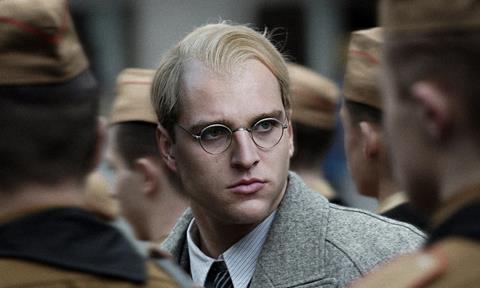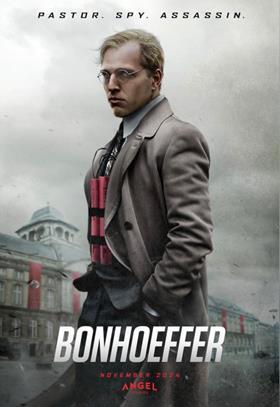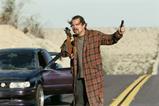Bonhoeffer isn’t a nice story about someone standing up for their faith. It’s a warning to all Christians not to tie themselves to any one political identity, says our reviewer

The challenge with any biopic is to make a film that is more than just a Wikipedia summary of a person’s life, but something dramatically and artistically satisfying, with insight and ideas.
If all you do is depict the “greatest hits” of a life, you’d be better off reading a book or watching a documentary. Films need to say something more, and many biopics fail to do just that. So the average viewer would be forgiven for approaching a film about the life of Dietrich Bonhoeffer with trepidation - one of the most remarkable theologians of the 20th Century deserves a film that captures his brilliance. Will it be a trudge through key events without much drama, or will it be a film that has something to say?
The good news is that Bonhoeffer: Pastor Spy Assassin manages to defy its dreadful (and misleading!) title and acquit itself as a decent stab at telling the theologian’s inspiring, faith-filled story. It is a handsomely shot, well-performed and thoughtful depiction of a man who gave up everything in the service of truth. Most surprisingly of all, it is unafraid to mine an 80-year-old story for modern relevance, in a way that might ruffle the feathers of its own target audience.
Who was Bonhoeffer?
Dietrich Bonhoeffer was a German theologian who studied in America and came to prominence in Germany under the rise of the Nazis. Bonhoeffer was heavily influenced by the Pentecostal church in the US and returned to his home country full of ideas about the need for a personal relationship with God rather than simple membership of an institution. He saw the German church at the time as dead, and his suspicions were confirmed when the church came out in support of Hitler and his antisemitism.
We are citizens of heaven, first and foremost
In resistance to this, Bonhoeffer established the Confessing Church, which emphasised devotion to God over any political ruler or institution. He saw Hitler as anathema to Christianity, and even became involved in a plot to kill him. Bonhoeffer’s stand for truth and justice ultimately cost him his life in the closing days of the war.
Telling the story
One thing becomes clear immediately as the film begins: the film-makers know their subject well. The screenplay wants to pack in all the information it can about Bonhoeffer, from his childhood adoration of his brother to his discovery of jazz. As a result, it regularly feels overstuffed and under-edited. Most scenes drag on for longer than they should, while some should have been cut altogether.
There’s a lack of subtlety, especially in the dialogue. It can sometimes spell out what is going on thematically, with stilted conversations intended to hammer home a point. This is a recurring problem with Christian cinema, which has a tendency towards writing sermons instead of conversations. Generally people don’t speak like theological textbooks; audiences should be trusted to pick up the nuances between the lines.
The film is at its strongest in the first half, when Nazism slowly starts to creep into every facet of German life and Bonhoeffer - who had recently returned from America - responds at first with surprise and then with horror. It’s easy to imagine that Hitler rose to power overnight and seized control; fascism instead crept in gradually. This is a much more uncomfortable truth and Bonhoeffer depicts it well. The emergence of Nazism starts with “reasonable conversations” about Hitler’s ideas, before it shifts to politicised sermons, eventually leading to teenagers wearing swastikas and the persecution of social groups. Jonas Dassler portrays the theologian with a quiet strength, capturing his early, prickling sense of discomfort in a way that makes his later firebrand convictions all the more convincing.
Evil is often much more insidious and subtle than cinema would have you believe
The second half of the film is much patchier as it starts trying to do too much with a limited screenplay. As a result, the timeline becomes muddy, never quite being clear where in history we are or what Bonhoeffer’s role is. In particular, the assassination plot is muddled. In theory, it should be the most cinematically exciting episode in Bonhoeffer’s life, but the players and the plan jumble together.
The film also makes the Nazis too cartoonishly evil, including unhelpful half-truths such as the idea of a Nazi Bible with new ten commandments. A group of theologians did produce Hitler-praising texts, including edited scriptures, but it was never commissioned by Hitler and was never referred to as a Bible. This may seem like nitpicking, but such details are important. Evil is often much more insidious and subtle than cinema would have you believe; we should be wary of wolves in sheep’s clothing, not wolves loudly announcing themselves to be wolves.
All of which then leads to the most interesting question at the heart of this film: what relevance does Bonhoeffer’s life hold for us today?
A warning
The family of Bonhoeffer himself are upset about this film. They have put out a statement decrying the way that certain right wing parties have co-opted his image to serve their own ends. In particular, their statement criticises the way he is being used as an emblem of Christian Nationalism, a movement he would have hated.
The Bonhoeffers go on to condemn the film itself, describing the distributor Angel Studios as a “right-wing evangelical production company” and calling the film a “history-distorting biopic, which turns Bonhoeffer into an evangelical saint.”
Angel Studios has indeed courted right-wing audiences before, flirting with conspiracy theories with films such as Sound of Freedom and making opposition to “woke” Hollywood part of their marketing. Yet, they also produce other far more politically neutral content, such as Testament or The Chosen, which are sincere and often impressive attempts at good Christian storytelling.
If Christian Nationalists have indeed adopted the name and teaching of Bonhoeffer to validate their own political beliefs, then they have missed the point of everything he was trying to say. And there is certainly a reading of this film that is a warning against Christian Nationalism.
The spectre of the newly re-elected Trump hangs over the film, whether it is the director’s intention or not. In an era when Christians in the US join vast rallies to wholeheartedly endorse and vote into power a political candidate who trades in division and nationalism, it’s hard not to see echoes in this story.
The film is at its best when wrestling with this issue. For instance, it shows that Bonhoeffer’s views on racism were shaped by his experiences with the Black Church in America. He witnesses the ugliness of racial hatred first-hand, which contributes to his nausea when seeing it in a different form in Germany. His anti-Nazism and anti-racism are cut from the same cloth. By linking these two issues so explicitly, the film doesn’t allow the audience to dismiss the issues of the 1930s as a historical problem. It stirs the audience to reflect on where it might still exist today.
Some lines feel especially pointed. Dietrich argues of Hitler that “this man is without charm, without character, without charisma.” His friend responds: “But he has captured the nation”. Does that sound familiar? Another painful line sees Bonhoeffer condemn church leaders, telling them that the church should be a place of refuge, not a place of power. He accuses them of “choosing full pews over the truth.” It’s not over the top to draw these comparisons, as there are many supporters of Trump openly calling themselves “Christian Nationalists”, and, as Jared Stacy has pointed out in articles for Premier Christianity, many people are explicitly tying their faith to their zealous endorsement of the former President and convicted criminal.
Bonhoeffer, therefore, should serve not as a nice story about someone standing up for their faith, but as a warning to all Christians not to tie themselves to any one political identity. We are citizens of heaven, first and foremost, and our mission is not to protect any individual country, leader or human ideology.
Even if the creative team behind this film didn’t intend for it to be explicitly about one current political situation, its relevance should provoke viewers on all sides of the argument. The film ends with Martin Niemöller’s Stuttgart Declaration of Guilt, acknowledging the complicity of the church in accommodating the evil perpetrated by Hitler. It says “we accuse ourselves for not standing for our beliefs more courageously, for not praying more faithfully, for not believing more joyously, and for not loving more ardently.” Who among us could not co-sign this clause of the declaration?
One hopes that Angel Studios’ audience will be discomfited by these themes if they choose to see them in the film. And that’s what makes Bonhoeffer so interesting in its best moments. Cinema as an art form should provoke and inspire, not just reel off plot points.
Grace

One of the most moving scenes in the whole film occurs towards the end, when Dietrich knows that he is scheduled for execution. He gathers the other prisoners around for a final communion, and one of the Nazi guards, knowing that the war is lost for him, joins them. This, if anything, is the most uncomfortable and most wonderful idea in the whole film; a man wearing the hallmarks of evil on his sleeves joins the people he persecutes in a moment of grace and community. That should outrage and inspire in equal measure, reminding us of the biggest picture, that God’s grace is for everyone who chooses to accept it, even those we hate and who hate us.
So overall, this is one of the more impressive films you’ll see released by Angel Studios, with genuine drama and provocative insights. It could have gone further, especially digging into the question of the assassination attempt on Hitler, which is left curiously under-explored theologically. It is also regularly let down by flabby editing and clunky dialogue, which takes away from the power within the story. But writer/director Todd Komarnicki deserves credit for not dodging other hard questions and for giving space to the story’s uncomfortable modern relevance. Bonhoeffer’s courage remains as provocative and powerful as ever.

Bonhoeffer will be showing in US cinemas from 22 November 2024, and in selected UK and Irish cinemas from 7 March 2025





































7 Readers' comments